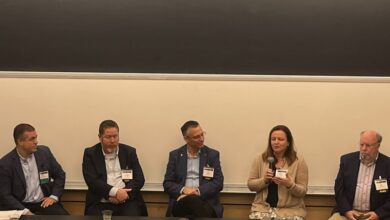How will artificial intelligence’s role impact local, state governments?

What if a chatbot could instantly give you instructions for getting a certain permit? What if council meeting minutes could be posted within minutes? What if your wait time at the DMV was cut in half?
These are just some ways artificial intelligence could be used in state and local government.
AI was the topic of a groundbreaking conference in Annapolis Tuesday morning, put on by the University of Baltimore.
It’s a complex problem.
“Why seemingly simple jobs take long if they’re farther from the main operations,” said Berke Attila, Director of General Services in Baltimore City.
But, those problems could be solved in a matter of minutes.
“I should be looking at my resource allocation, increasing staffing, maybe process optimization,” Attila said.
Using artificial intelligence, Atilla created a plan to make the department more efficient, something he says normally takes months and multiple analysts to do.
“And it gave me data visualizations to add to my memo if I want to,” Attila said.
It was one of many uses for artificial intelligence discussed at the William Donald Schaefer Conference titled, “AI and the Future of Government.”
“You could use it to simulate urban planning scenarios,” said Dylan Hayden, social science analyst for the U.S. Department Housing and Urban Development.
Hayden said AI can help with anything from drafting policy documents and analyzing large datasets.
“It can detect patterns and find correlations in unstructured data,” Hayden said.
AI can help by streamlining and automating public services.
“How easy would it be to say, ‘Hey these are my needs, is there a program that matches up to my needs?” said Rebekah Opher, Next Gen intern at the University of Baltimore.
Maryland Gov. Wes Moore’s Artificial Intelligence Executive Order laid the groundwork for the state government to start integrating AI into operations.
Nishant Shah, from Maryland’s Department of Information Technology, is one of the officials tasked with making sure it’s used responsibly.
“Our use of AI should be clearly documented and disclosed,” said Shah, Senior Advisor of Responsible Artificial Intelligence for the Maryland Department of IT. “Individual’s privacy rights are protected by design in our use of AI.”
One of the biggest takeaways from the conference when it comes to integrating AI into business and government is that what we do in the next two years will determine the next dozen.



